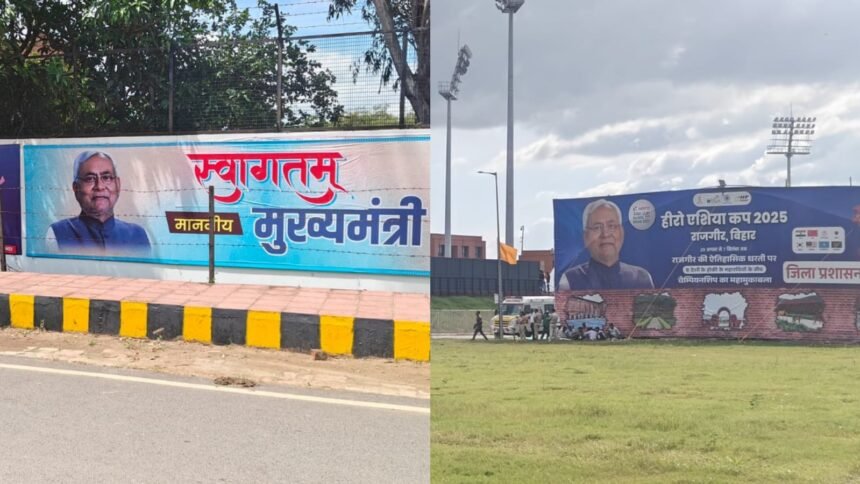Eight nations, 150 players and many more officials have descended on the ancient Bihar town of Rajgir for the Hockey Asia Cup. Yet, the backdrop of the highly-consequential tournament — which doubles up as a qualifier for the 2026 World Cup — is less hockey, more politics.
With the state heading to the polls later this year, all around the aesthetically-designed, 99.7-acre, Rs 600-crore complex are posters and hoardings of Chief Minister Nitish Kumar.
Seeking a fifth consecutive term in office, the Chief Minister is everywhere – on banners at the entrance to the stadium; on the buses that ferry the teams; on a balloon hovering over the ground; on the lamp posts that light up the tiny, winding streets; and the water tank overlooking the town. He appears during matches smiling on the digital ad-boards around the field of play, and peeks into the ground from a giant hoarding just behind the north stand. He also appears on the state government’s website, promoting the Asia Cup.
Nitish unveiled the tournament’s logo, mascot and the trophy. On August 29, he travelled to Rajgir to inaugurate the Asia Cup. Before the India-China match, Nitish took a lap of the stadium, waving at the thousands of spectators for close to 15 minutes.
The Asia Cup, he hoped, would make Bihar a ‘global’ destination. “The tournament’s arrival in Bihar underscores the state’s growing prominence on the global sports stage,” he was quoted as saying in a statement released by Hockey India earlier this year.
Tapping into hockey — a sport of sentimental importance to many Indians — as a soft power project isn’t a new strategy. For the last 11 years, Odisha has used the sport as a vehicle to promote itself as a sporting and tourism destination by investing heavily in building infrastructure and hosting international tournaments in Bhubaneswar and Rourkela.
 Chief Minister Nitish Kumar’s photograph can be seen on an official team bus. (Express Photo by Mihir Vasavada)
Chief Minister Nitish Kumar’s photograph can be seen on an official team bus. (Express Photo by Mihir Vasavada)
This is only the third time since 2014 that an official senior men’s international tournament in India is being held outside Odisha after the 2014-15 FIH World League Final in Raipur and the 2023 Asian Champions Trophy in Chennai.
Story continues below this ad
Bihar State Sports Authority Director General Raveendran Sankaran said the tournament was planned years ago and was not ‘election-oriented’.
“I beg to differ. If this would have happened in haste, thinking that elections are around the corner, it was a different story. But we started two years ago,” Sankaran told The Indian Express.
“The moment the Women’s Asian Champions Trophy (also held in Rajgir last year) was finished, Hockey India approached us, asking, ‘Would you like to do the Asia Cup for men?’ That day itself, again, we spoke to the government and they said, ‘take it’. Back then, we didn’t know anything about elections.”
Sankaran said the true “motivation” is to turn around the sporting fortunes of the state.
Story continues below this ad
In the rapidly expanding Indian sports ecosystem, Bihar has remained a perennial laggard. There have been no international hockey players and, at the last National Games in Uttarakhand, the state finished 28th.
 Posters of Bihar CM Nitish Kumar outside team hotels of South Korea and Japan, near the stadium. (Express Photo by Mihir Vasavada)
Posters of Bihar CM Nitish Kumar outside team hotels of South Korea and Japan, near the stadium. (Express Photo by Mihir Vasavada)
State sports officials, however, said that sport has become a ‘priority’ in the last three years, with investments worth hundreds of crores made in different sports, from athletics to rugby. The hockey push, Sankaran said, can be viewed from that lens. “When I joined in 2022, it was only Rs 30 crore. Now, in 2025-26, it’s Rs 680 crore.”
Rajgir, almost the back of beyond, is an intriguing destination to host the competition. A little less than 100 km away from Patna, it has no sporting history and hockey generates little excitement among locals.
In the sparsely-populated countryside — where the sports complex is situated, in the middle of sprawling fields and the Rajgir Hills in the background — there’s little to suggest the continent’s showpiece tournament is being hosted here.
Story continues below this ad
Dozens of police personnel guard the empty streets to ‘ensure complete safety of the visiting teams’, according to a policeman stationed outside a modest hotel where the South Korean team is staying. It’s the only indication of something ‘important’ taking place in the vicinity.







